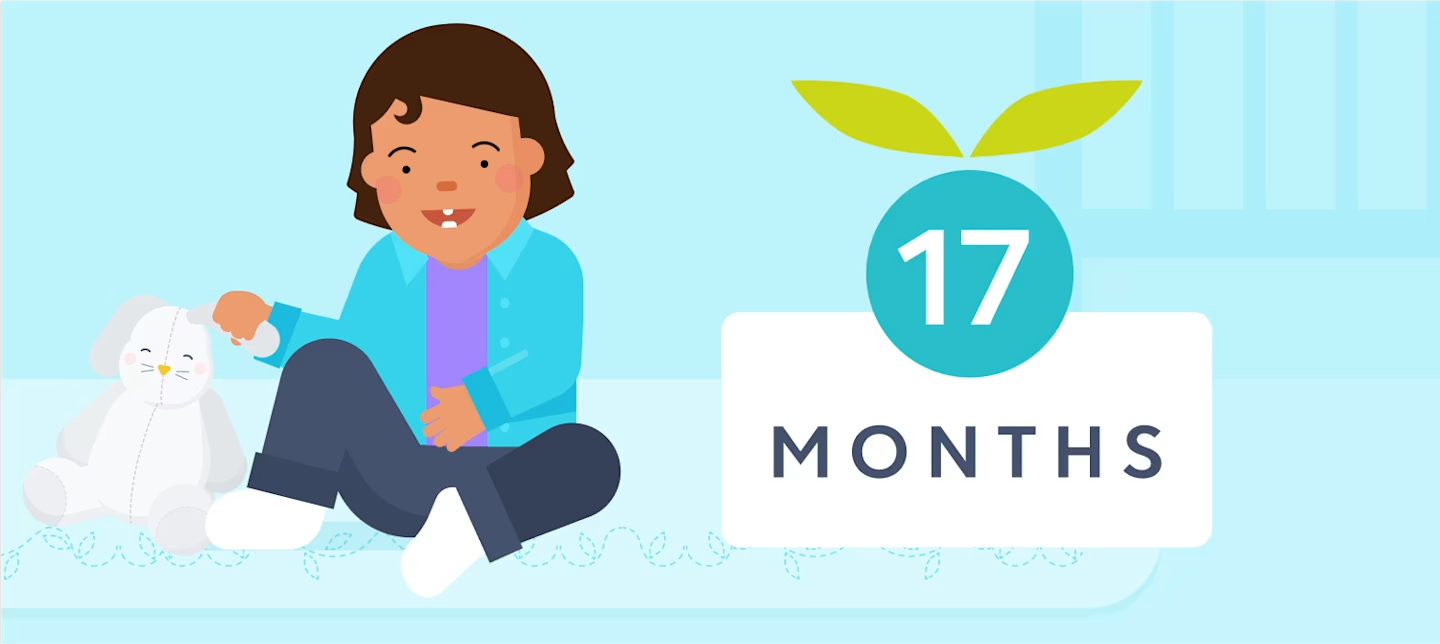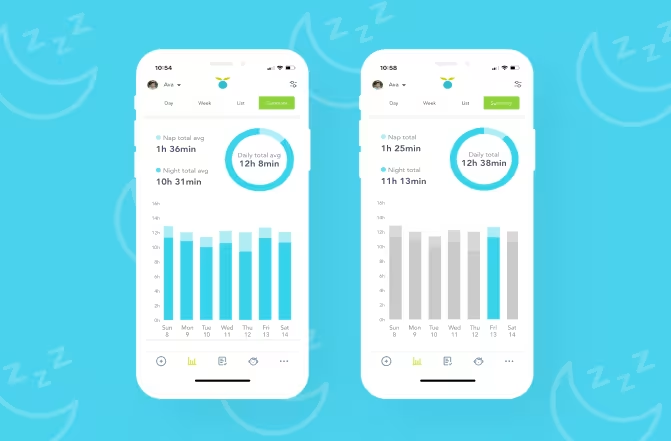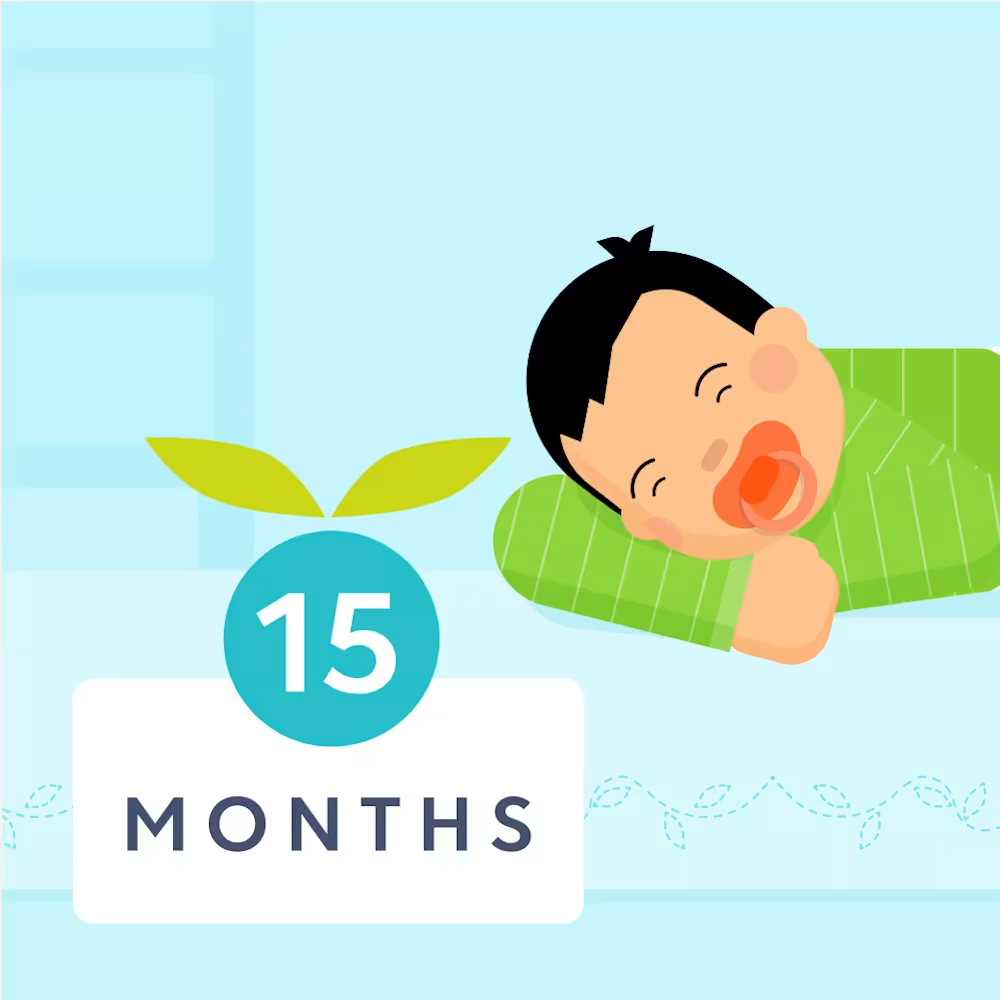17 month old sleep schedule: Bedtime and nap schedule
Updated Dec 15, 2025

By 17 months old, your toddler’s personality has really begun to shine! At this age, language development really takes off, and you may be amazed at how much your child is talking.
Ensuring your toddler gets enough sleep can improve their mood, limit tantrums, and help them process the new words and skills they’re learning at this age. Plus, a solid 17 month old sleep schedule also gives you much-needed breaks.
In this article, we’ll give you the lowdown on sleep development at this age, tips for what to do if your little one is attempting to climb out of their crib, and suggestions for daytime sleep battles.
How much should a 17 month old sleep?
At 17 month olds, we recommend aiming for 13 - 14 hours of total sleep over 24 hours for proper growth and brain development. This usually works out to around 10 - 12 hours of nighttime sleep and 2 - 3 hours during the day.
Keep in mind these guidelines are simply recommendations that work well for most children. But every kiddo is unique and it’s OK if your little one does best with more or less sleep. There’s a range of normal and that’s expected. We also recommend keeping tabs on your child’s mood and energy levels when determining if they’re getting the rest they need at 17 months.
Here's a quick overview of what you may expect when it comes to 17 month olds and sleep. Note that these figures are averages and should be used as guidelines.
Top sleep tip for 17 month olds
By 17 months old, many toddlers are tall enough to begin swinging one leg over the crib rail to climb out — or at least try. When this happens, parents often fear their child will get hurt and question if they should transition them to a . While this may be necessary in some cases, transitioning children to a toddler bed too soon comes with its own set of challenges. Before the age of 3, most children lack the impulse control necessary to stay in bed all night, which can lead to poor sleep and new safety considerations. Thankfully, you can try to prevent your child from climbing out of their crib by:
Lowering the crib mattress to the lowest setting if you haven’t already
Turning the crib around so the shorter side is against the wall if it has a shorter front rail
Consider a toddler sleep sack which limits how much your little one can move their legs
Remove toys or stuffed animals which could be used as a boost to climb out
Sample 17 month old sleep schedule

Note: Sleep needs vary by child and this chart should be viewed as an example.
Morning rise: 6:00 AM
Wake window before nap: 5 hours
Nap: 11:00 AM - 1:00 PM (2 hour nap)
Wake window before bedtime: 5.5 hours
Get ready for bed: 6:00 PM
Asleep: 6:30 PM
Naptime schedule for a 17 month old
By 17 months old, most toddlers have transitioned to a, though some children are still taking. It’s also common for kiddos to switch between 2-nap and 1-nap days (if your schedule permits) when transitioning to a new schedule. Once your kiddo is consistently napping once a day, you can expect about 5 - 5.5 hours of awake time before and after the nap.
A typical nap schedule for 17 month olds taking 2 naps per day includes approximately 3.25 - 4 hours of awake time before the first nap and about 3.5 - 4 hours before the second nap and before bedtime.
How long should a 17 month old nap?
Most 17 month olds do best with 2 - 3 hours of sleep during the day. While still taking 2 naps, aim for both naps to be at least 1 hour. Once a child drops their second nap, the remaining nap is usually around 2 hours.
Note it may take a week or more for the nap to lengthen when your toddler first moves to a 1-nap schedule. Short naps are normal at first and may gradually extend as your toddler adjusts. Be sure to offer lunch before the nap to ensure hunger doesn’t lead to a short nap. That might mean “lunch” is early, around 10:30 AM or 11:00 AM. Giving them time to settle into their new routine, while keeping nap and bedtime consistent, can also help encourage longer, more restful naps.
How many naps for a 17 month old?
Most 17 month olds are down to 1 nap per day. If your 17 month old is still taking 2 naps per day, it’s likely they’ll transition to a 1-nap schedule soon.
2-nap schedule
1-nap schedule
Bedtime for a 17 month old
A consistent bedtime routine is key for toddlers, especially as they start testing boundaries []. If your little one suddenly decides to crawl away during storytime, dump out a basket of toys, or empty their dresser drawers, you’re not alone! These antics are often a way to test limits — and while they may be amusing to your toddler, reacting too much can turn bedtime into a game. Instead, keep things calm and consistent. If they won’t sit still for a book, keep reading anyway to signal that bedtime is moving forward.
At this age, toddlers benefit from longer wind-down routines in a dimly lit environment to help their bodies prepare for sleep. Even if they seem extra tired or uninterested, try shortening the routine rather than skipping it entirely. Once the lights are off, expect your child to take 10 – 20 minutes to fall asleep if bedtime is timed well.
What time should a 17 month old go to bed?
A consistent bedtime is key to helping your toddler regulate their internal clock and get the restorative sleep they need. Most 17 month olds do best with 10 – 12 hours of sleep overnight, which means bedtime typically falls between 6:00 and 8:00 PM. If your child has recently transitioned to 1 nap or isn’t napping for at least 2 hours during the day, an earlier bedtime can help prevent overtiredness. Aim to move it no earlier than 6:00 PM to avoid reinforcing early morning wake-ups.
Why does my 17 month old keep waking up at night crying?
Has your 17 month old been sleeping through the night and now they're suddenly waking overnight and calling out for you? You're not alone! Here are a few common factors that may lead to sleep challenges around this age:
Falling asleep with assistance (e.g. patting, rocking, feeding to sleep) and wanting the same support overnight
Needing a schedule adjustment
Teething
Mastering milestones
Hunger
If you’re looking for personalized sleep support, consider submitting for a cusom, step-by-ste Sleep Plan via .
Is there a sleep regression at 17 months?
Contrary to popular belief, don't follow the calendar — your child won't instantly begin sleeping poorly at a certain age or date. However, around we commonly see an increase in factors that contribute to poor sleep. If your kiddo is newly resisting or skipping naps, waking early, and/or waking up more at night at this age, we’d call this a sleep regression.
Can my 17 month old sleep with a pacifier?
It's OK for 17 month olds to use a pacifier during sleep and awake times. At this age, children typically have teeth so check them periodically for wear and tear. It's best to replace old ones if they've turned color or ripped due to use over time [].
Can a 17 month old sleep on their stomach or side?
At 17 months, your child can safely sleep on their stomach or side if they’ve rolled into that position on their own and can roll both ways. Starting sleep on the back is recommended by the AAP [], but allowing them to self-position is part of normal sleep development.
Can I sleep train a 17 month old?
Sleep training can be an effective tool for helping your child learn independent sleep habits . There are of sleep training and not all of them are “cry it out." For example, some are slower and more gradual while others are faster and prioritize results. There's no one-size-fits-all method for each family — take into account your child's personality and your parenting style when deciding which is a good fit.
What are the developmental milestones for a 17 month old?
This is an exciting month of development. Your is likely walking (and maybe running!) and showing a range of emotions — even if that includes some tantrums. Here's what your 17 month old may be doing and trying this month:
Walking (8 - 18 months) and starting to run (15 - 18 months)
Drinks from a cup and eats with a spoon
Communicates with single words (and may have learned a few more)
Shows a range of emotions — from temper tantrums to affection
Follows simple, one-step instructions
May point to show you things of interest
Use objects as they’re intended — like typing on a toy computer’s keyboard
Imitate what they see others doing (e.g. copying parent doing chores or brushing their teeth)
May walk backwards
May walk upstairs with assistance
Scribbles spontaneously
Builds a two-block tower (15 - 17 months)
May begin to use two-word phrases (16 - 24 months)
Combines sounds and actions (points to water and says “wawa”)
Does a 17 month old need to eat during the night?
At 17 months, most children can go all night without eating. However, if they're waking overnight or super early in the morning and you suspect it's due to hunger, we recommend evaluating when they ate dinner. Sometimes if mealtime is on the early side, they may benefit from moving it later or a healthy snack before bed.
Takeaway
By 17 months old, most toddlers have transitioned to a, though some children are still taking. Kiddos may switch between 2-nap and 1-nap days (if your schedule permits) when transitioning to a new schedule.
Most 17 month olds do best with 2 - 3 hours of sleep during the day. While still taking 2 naps, aim for both naps to be at least 1 hour. Once a child drops their second nap, the remaining nap is usually around 2 hours.
If your child has recently transitioned to 1 nap or isn’t napping for at least 2 hours during the day, an earlier bedtime (but not before 6:00 PM) can limit overtiredness.
If you're curious about what lies ahead in the coming month, glimpse into the future to see what you might experience once your baby is on an . Also check out a to see how far your little one has come.
Share article:
Note: The content on this site is for informational purposes only and should not replace medical advice from your doctor, pediatrician, or medical professional. If you have questions or concerns, you should contact a medical professional.
4 Sources
Share article:







